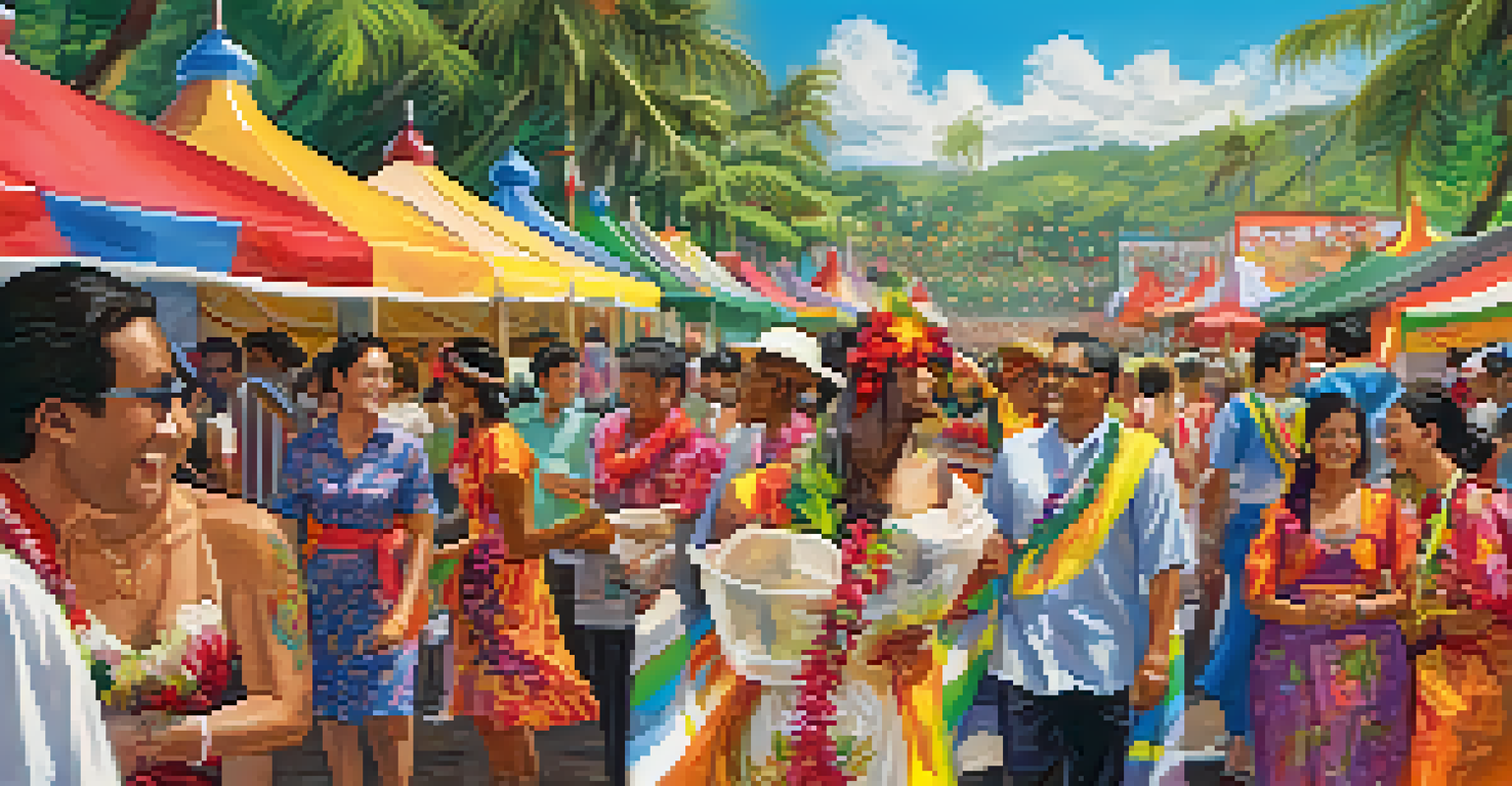Honolulu's Strategic Location in Pacific International Relations

Honolulu: A Geographical Nexus in the Pacific
Honolulu, located on the island of Oahu, serves as a crucial geographical hub in the Pacific region. Its position allows easy access to both Asia and the Americas, creating a natural meeting point for international trade and diplomacy. This central location has made Honolulu a focal point for various global interactions, fostering connections that extend far beyond its shores.
Geography is destiny.
The city's unique geography is not just about convenience; it also plays a significant role in the strategic military positioning of the United States. With the Pacific Ocean as a backdrop, Honolulu hosts key military bases that are vital for national security and regional stability. This military presence further cements the city's importance in international relations, as it acts as a deterrent to potential conflicts while also facilitating cooperative efforts.
Moreover, Honolulu's strategic location has attracted various international organizations and businesses, enhancing its role as a diplomatic and economic center. The convergence of cultures and interests in this city creates an environment ripe for collaboration, making it a significant player on the Pacific stage.
Historical Context: Honolulu's Role in Pacific History
To understand Honolulu's current significance, we must first look back at its historical context. The city has long been a pivotal location for trade routes and military strategy, especially during World War II. The attack on Pearl Harbor in 1941 marked a turning point not just for the U.S., but for the entire Pacific region, highlighting Honolulu's strategic value in global conflict.

In the post-war era, Honolulu transitioned from a military outpost to a vital diplomatic player. The establishment of the East-West Center in 1960 further solidified its role as a hub for international education and research. This institution has facilitated numerous dialogues and collaborations among nations, reinforcing Honolulu's importance in fostering peace and understanding in the Pacific.
Honolulu: Strategic Pacific Hub
Honolulu's central location enhances its role in international trade, diplomacy, and military strategy.
Honolulu's historical significance continues to shape its contemporary role in international relations. The lessons learned from past conflicts and collaborations inform current diplomatic efforts, making the city a living testament to the complexities of Pacific interactions.
Economic Implications of Honolulu's Strategic Position
Honolulu's strategic location is not only important for diplomacy but also for its economic implications. The city serves as a major tourist destination, attracting millions of visitors each year, which bolsters the local economy. This influx of tourists generates revenue and creates jobs, contributing to both local and international economic dynamics.
Cultural exchange is a way of building bridges between communities and nations.
Additionally, Honolulu acts as a trade hub, linking the U.S. mainland with Asia and beyond. The Port of Honolulu facilitates the movement of goods, making it an essential node in global supply chains. This economic activity not only benefits the city but also enhances its influence in international trade discussions and agreements.
Moreover, the city's unique position allows for the growth of various industries, including technology and green energy. As Honolulu continues to innovate and diversify its economy, its strategic location will play a vital role in attracting investment and fostering international partnerships.
Cultural Exchange: Honolulu as a Melting Pot
One of the most enriching aspects of Honolulu's strategic location is its role as a melting pot of cultures. The city is home to a diverse population, including Native Hawaiians, Asian Americans, and many other ethnic groups. This cultural diversity has fostered a rich tapestry of traditions and perspectives, making Honolulu a microcosm of Pacific unity.
Cultural exchange in Honolulu is not just a social phenomenon; it also has significant implications for international relations. Festivals, art exhibitions, and culinary events often showcase the rich heritage of various cultures, promoting understanding and solidarity among different nations. This cultural diplomacy can lead to stronger bilateral relationships and collaborative initiatives.
Cultural Diversity Drives Diplomacy
The city's rich cultural tapestry promotes understanding and collaboration among nations, strengthening international relations.
Additionally, educational programs and cultural institutions in Honolulu facilitate international exchange, allowing for greater collaboration among scholars and artists. These interactions help build bridges between countries, further enhancing Honolulu's reputation as a cultural and diplomatic hub in the Pacific.
Environmental Considerations: Honolulu's Role in Sustainability
Honolulu's strategic location also positions it as a leader in environmental sustainability initiatives in the Pacific. The city faces unique challenges, such as rising sea levels and climate change, prompting local leaders to implement innovative solutions. These efforts not only aim to protect the island's natural beauty but also set an example for other Pacific nations.
Sustainable practices in Honolulu often involve partnerships with international organizations and governments. These collaborations focus on renewable energy, conservation, and disaster preparedness, showcasing how local actions can have global implications. By addressing environmental issues collectively, Honolulu plays a significant role in shaping regional policies and strategies.
Moreover, the city's commitment to sustainability enhances its attractiveness as a destination for eco-tourism. As visitors become more conscious of their environmental impact, Honolulu's focus on green practices may draw in tourists who are eager to support sustainable initiatives, further intertwining the city's economy with international environmental efforts.
Diplomatic Engagements: A Hub for International Conferences
Honolulu's strategic importance is evident in its role as a host for various international conferences and summits. The city's appealing location and infrastructure make it an ideal venue for discussions on pressing global issues, including security, trade, and climate change. Events such as the Asia-Pacific Economic Cooperation (APEC) meetings highlight Honolulu's capacity for facilitating critical dialogues.
Hosting these high-profile events not only enhances Honolulu's global visibility but also strengthens its position as a diplomatic center. Leaders from around the world gather in the city to forge agreements and collaborations that impact the entire Pacific region. This engagement fosters a spirit of cooperation, demonstrating the city's value as a meeting ground for diverse interests.
Sustainability as a Global Leader
Honolulu's commitment to environmental sustainability sets an example for other Pacific nations while attracting eco-conscious visitors.
Furthermore, these diplomatic events often lead to lasting partnerships and initiatives that extend beyond the conferences themselves. As Honolulu continues to attract international gatherings, it solidifies its role as a key player in shaping Pacific international relations.
Challenges and Opportunities in Honolulu's International Role
While Honolulu enjoys many advantages due to its strategic location, it also faces challenges that could impact its role in international relations. Issues such as over-tourism, housing shortages, and economic disparities can strain local resources and affect the quality of life for residents. Addressing these challenges is crucial for maintaining the city's appeal as a diplomatic and economic hub.
On the flip side, these challenges present opportunities for innovation and growth. By developing sustainable tourism practices and investing in affordable housing, Honolulu can create a more resilient community that supports its international role. Engaging local residents in these efforts fosters a sense of ownership and pride, further enhancing the city's global image.

Ultimately, how Honolulu navigates these challenges will determine its future in Pacific international relations. By leveraging its unique position while addressing local concerns, the city can continue to thrive as a vital player on the global stage.